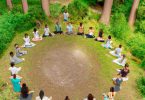How Alliance Growers is Cultivating Something Special in The Great White North
Yeah, that’s US. We were standing on the side of the road, looking north, and we saw movement. Not from behind, to the south, but northeast and northwest. And yeah…when they passed US, it felt a little like when my wife and I pulled into a self-serve gas station in Lake Preston, South Dakota in a new, white 2006 Dodge Charger, and witnessed a purple ’69 Charger pull in. Which translated meant and still means “yeah, I was doing something cool, but what the other guy did was way, way cooler”.
So you can imagine my interest in chatting with Dennis Petke, CEO, President, and Director of Alliance Growers Corp., a global medical cannabis company, with their head office in Vancouver, British Columbia (BC), and their flagship project in Mission, BC, as well as a cannabis grow facility in Mount-Royal, Quebec. And Mission’s an appropriate town name for these guys to thrive in, with their 25-acre sprawling landscape which will be home to the Cannabis Biotech Complex (CBC). The main component of the Complex, will be the Pharmagreen Biotech Centre (PBC), a tissue culture facility, with the addition of nursery greenhouses and in 2020, an extraction and distillation facility, with plenty of room to expand.
The PBC is where Alliance Growers, as a strategic partner to WFS Pharmagreen, will be generating tissue culture plantlets. Whereas cloning involves taking a cutting from a mother plant, and then planting that seedling individually, preparing tissue cultures involves taking slices of the mother plant, which are then cultured and grown in a clean-room environment. Each leafy explant or single nodal cutting is then grown in a culture vessel under sterile cultivation conditions. “Using this method”, Petke explained, “we can create hundreds of thousands and even millions of disease free, genetically perfect plantlets of any cannabis variety. With cloning, the cultivar can come off a bit, and the potency can come down. Tissue cultured plantlet can result in better quality products at lower costs.”
Tissue-cultured plantlets can offer some advantages compared to traditional propagation methods. They take up little space, swiftly produce mature plants, can be grown in sterile, easily transported containers better inhibiting diseases, pests, and pathogens. The traditional process of tissue-culturing plants encompasses four steps: 1) Initiation, 2) Multiplication, 3) Rooting and 4) Hardening. Dr. Fawzia Afreen, at the Botanical Research in Motion (B.R.I.M.), however, developed a novel, proprietary way to combine two of the steps, thereby increasing efficiency and profitability. Not every company, though, has a Dr. Afreen. “Expertise in this methodology is limited,” Petke commented. “That’s one of the main reasons why big companies aren’t doing it.”
The PBC in size, initially, is capable of producing 10 million tissue cultured plantlets, babies, or startsper year, and 10 million of anything except things like molecules, blades of grass, and grains of sand, is commanding. WFS Pharmagreen and Alliance hope to augment this current goalof 10 million plantlets with an additional 10 million per year when they implement their expansion plan for the PBC in 2020. Each plantlet is expected to sell at wholesale for CAD$10 each, with a cost of CAD$1 each.And with WFS Pharmagreen’s expectation to be operating their own extraction and distillation facility in 2020, extractions costs can be further reduced, in comparison to using a third party extraction service.
Another exciting product for Alliance is their CBD Dana Hemp plant. This variety typically tests between 10-14% CBD, with the required < 0.3% THC. One example of the economics of this plant is the production of CBD Crystallate. The starting material is200,000 disease-free, genetically perfect, female only plantlets. When the hemp is grown and harvested, it is expected to yield 100,000 kilos or just over 220,000 pounds of biomass. With extraction and distillation, the extracted biomass is expected to yield approximately 3000 kilos (~6600 pounds) of 99% pure CBD crystallate, which can fetch CAD$10000/kilo, or CAD$30 million. Another option is to sell the biomass at CAD$200 per pound.
The Quebec facility is about three to four months away from receiving their cultivator’s license. The Access to Cannabis for Medical Purposes Regulations (ACMPR) have streamlined the process for cannabis companies to become licensed producers. “For some applicants, it’s questionable as to their likelihood of success in being granted a license, as there are many factors that Health Canada considers. Petke commented.“We are confident of our probability of being granted a license in a reasonable period of time, because of three factors. First, Quebec has made it known to the Federal Government that it fully expects 20% of the licenses approved in Canada. Second, we are working with a professional group in Quebec, including GroupeIcore, who were involved in six of eight approved applications. And third, we have access to what we consider to be Canada’s top grow team (the original MedReleaf team) through our strategic partner, Canwe.”
Using their tissue-culture methodology, Alliance’s PBC plans to take custom orders regarding what cannabis varieties licensed practitioners want. “We would like to see Health Canada make tissue-cultured plantlets a standard for cultivating medical cannabis,” Petke added. With the expertise to provide tissue-cultured plantlets to the industry, as well as for our own use, and the expertise to be a high-quality, low-cost producer of cannabis for medical purposes, coupled with the technology to extract CBD, and create low cost CBD and THC extraction protocols for patient treatments, Alliance Growers and their partners are cultivating something special.










